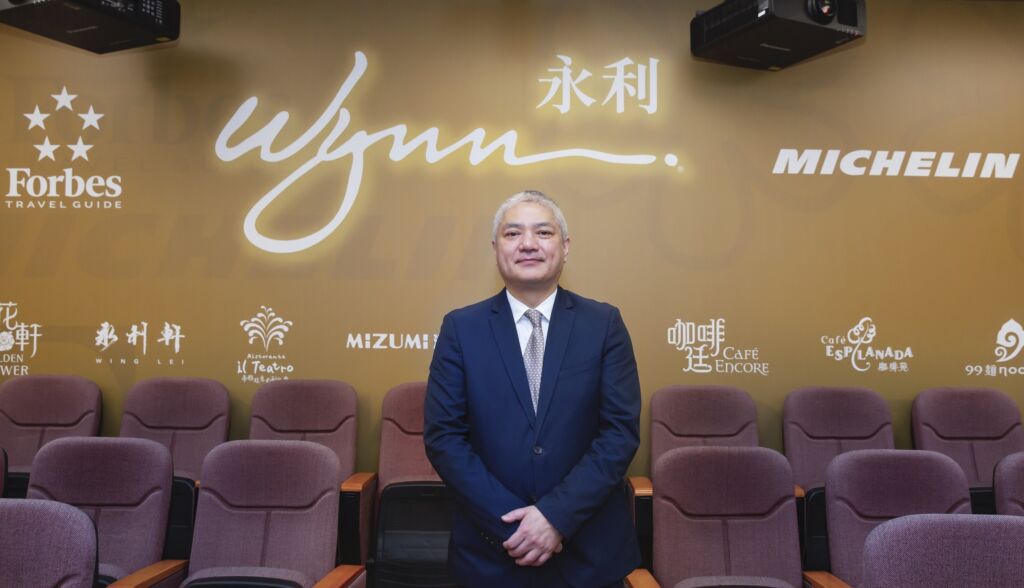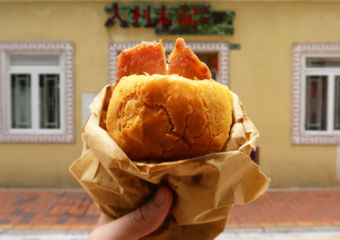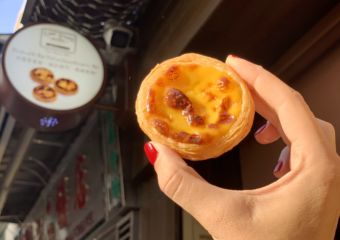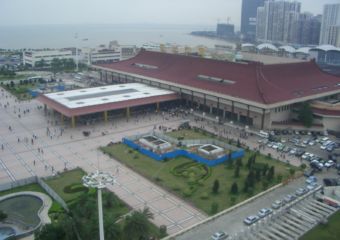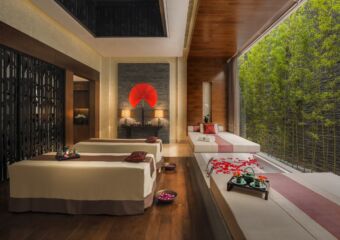Executive Director of Wynn Macau Food & Beverage Academy, awarded cookbook author, scholar, founder of the Macau Culinary Association and a chef, David Wong is a man of extraordinary accomplishment throughout his culinary career and stands right at the forefront of the city’s booming gastronomic scene. We spoke to David to learn more about the Wynn Food & Beverage Academy, Macau as a designated Creative City of Gastronomy by UNESCO, and the historically rich Macanese cuisine, an invaluable cultural feature of the city.
You’ve led a truly remarkable career: your book “The Art of Modern Portuguese Cuisine” has been distinguished with the Gourmand World Cookbook award, you have worked alongside renowned chefs, served as an Executive Assistant Manager at the Institute for Tourism Studies (IFT), founded the Macau Culinary Association and currently oversee Wynn Food & Beverage Academy as its Executive Director. How did your journey into the culinary universe start?
From an early age, my parents had restaurants in the UK so I was brought up in the family business and the hospitality world, then went to college to study food and beverage. My first real job was as a commis chef at Spanghero’s, a French restaurant, named after the French rugby brothers, that was right opposite the Principality Stadium, the national stadium of Wales for the rugby union. After working in numerous fine dining restaurants in the UK and France, I returned back to Asia to work in Hong Kong, Macau, Singapore, and Thailand gaining valuable F&B experience in numerous five-star hotels before being asked to return back to Macau with the Institute for Tourism Studies to look after the F&B department and teaching-related courses. My goal was to cultivate young talents for the industry and now I am happy to see many of my old students from IFTM at Wynn doing a remarkable job.
How was it like to be a member of the judging panel for The World’s 50 Best Restaurants?
I am grateful to be a member of the judging panel for The World’s 50 Best Restaurants. I wish I had the chance to visit more restaurants from around the world to meet more people in the industry and explore the global culinary culture more.
Tell us about Wynn Food & Beverage Academy: the idea behind its creation, its mission, and your role within it.
The idea for the F&B Academy is to make it the benchmark for hospitality training on an international level in the region and to provide an ideal environment for our colleagues to grow. My role and mission are to oversee the academy to provide on-the-job training, professional certification, create career development, and a succession plan for all our F&B colleagues.
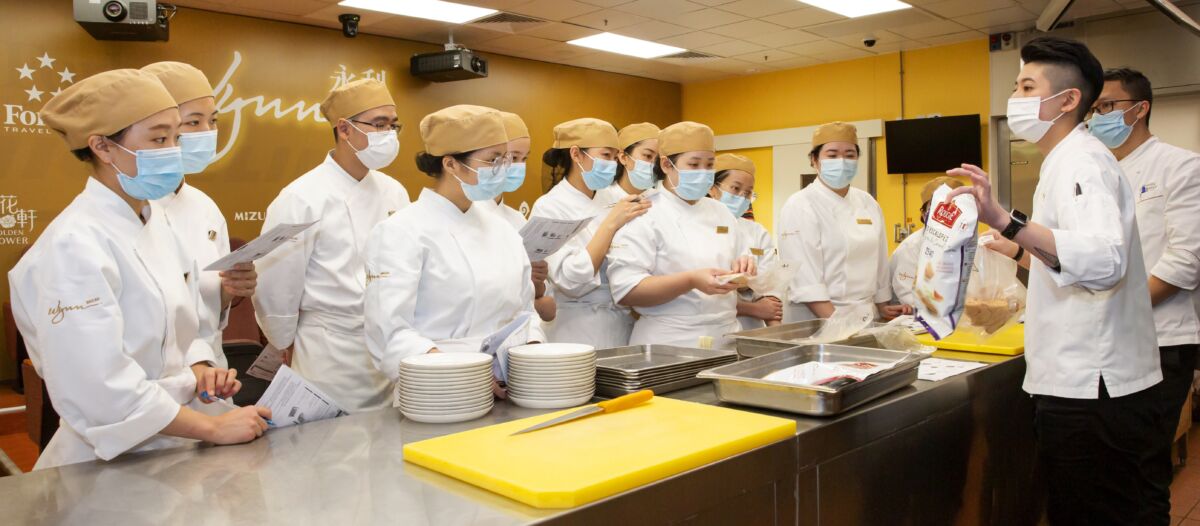
Photo credit: Wynn Macau
At the Wynn Food & Beverage Academy, you get to shape the chefs of tomorrow. Is Macau gastronomy’s future looking promising? Are these young talents keen on learning about Macanese cuisine?
We at the Wynn Food & Beverage Academy have a number of programs for the chefs of tomorrow including the Apprenticeship and Management trainee program alongside our series of Masterclasses plus we work with the Culinary Institute of America (CIA) for professional certification programs for our young talents. In order to preserve and pass on the culture of Macanese cuisine, we prepare various programs wherein senior chefs in the industry are invited to host masterclasses. Our trainers are given the opportunity to experience and learn traditional Macanese recipes first hand and benefit from the invaluable practical cooking experience. I think most of our trainees or apprentices are thirsty for more knowledge not just about Macanese food but all cuisines in general. Education and competitions are very closely related as competitions are put in education for the development of educational skills. We encourage our F&B colleagues to participate in competitions and help train and support them in the academy. A good example would be Wynn has won the last two Macanese cooking competition that was held at IFTM annually.
What kind of opportunities, programs, and certifications are trainees offered at the Wynn Food & Beverage Academy?
We offer a comprehensive range of diversified programs for the F&B and culinary team members to participate including new-hire and orientation programs; masterclasses; lectures and online learning and on-the-job training; we have three programs at the moment (F&B Management Trainee Program, Culinary Apprenticeship Program, and F&B Internship Programs) and also A Career Advancement Program. We collaborate with a number of institutions and colleges around the world to ensure team members receive internationally recognized, accredited qualifications. Some of the institutions and certifications include the Culinary Institute of America (CIA), the Sino-American Logistics Council (SALC), the Macao Institute for Tourism Studies (IFTM), the Macau Productivity and Technology Transfer Center (CPTTM), the Wines of Portugal Academy and Specialty Coffee Association (SCA). The Academy also partners with the CIA to provide a CIA-Certified Mentor program and a ProChef Certification Program. Trainers who have not graduated from CIA in the United States will still have the opportunity to obtain culinary skill certifications through these programs at Wynn.
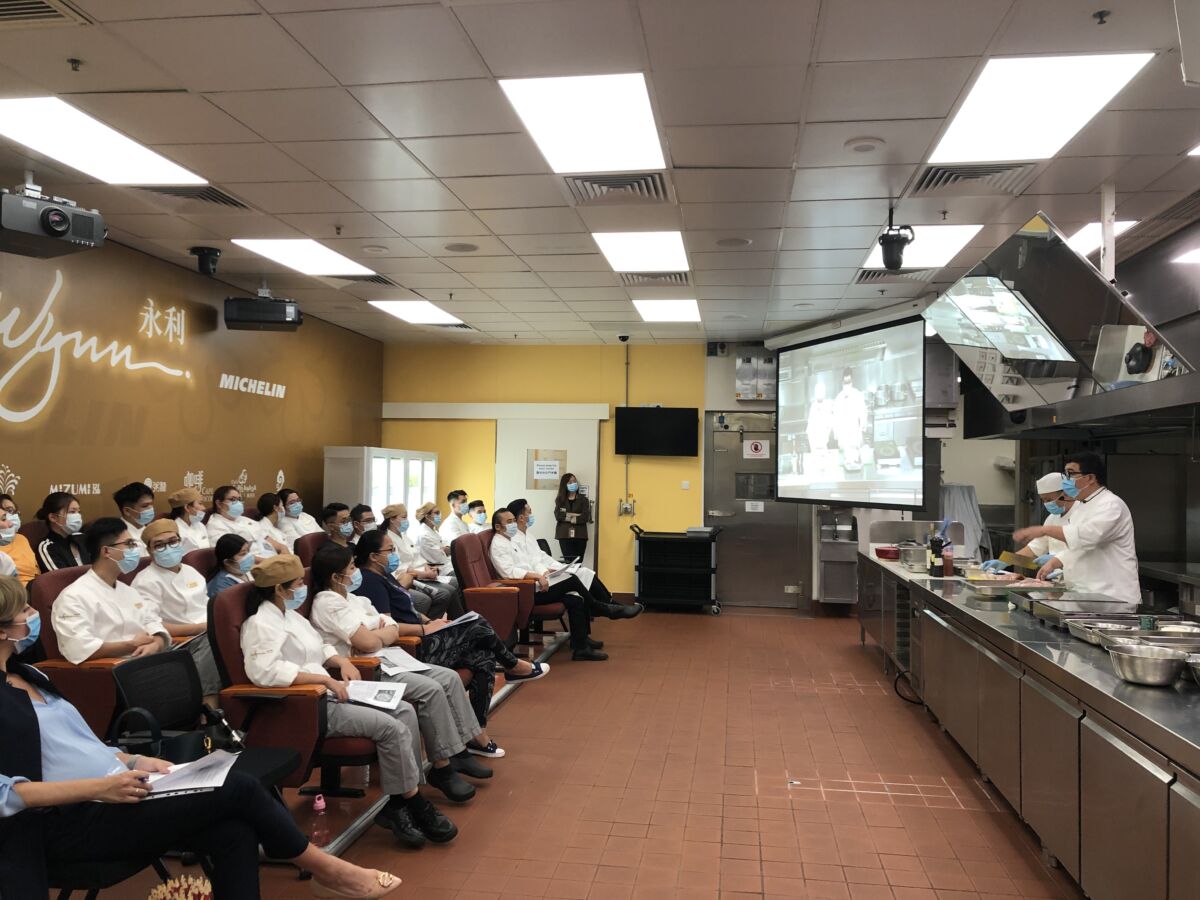
Photo credit: Wynn Macau
How do you think the academy plays a role in attracting and retaining talent for Wynn properties in Macau?
I think if you have the best learning environment for colleagues to learn and grow, and providing a career development plan for them in the long run, then you have more success in not only retaining good talent but also in hiring the best candidates. We also actively host and participate in various international F&B events, provide an array of rare learning opportunities for our talents to broaden their horizons, and equip themselves with the tools necessary to become international culinary professionals. We retain talent for Wynn only, but we hope it can help build the pool of culinary talents in the local catering industry.
Macau has been continuously designated a creative city of gastronomy by UNESCO since 2017. How can Wynn Food & Beverage Academy contribute to solidifying this historic recognition?
Wynn has been actively supporting and celebrating the government’s designation as a UNESCO creative city of gastronomy and now we are working with MGTO with several high profile gastronomy events such as the Asia’s 50 Best Restaurants, “Wynn Guest Chef Series” along with the masterclasses. The Academy also ensures our F&B team would gain an in-depth understanding of Macau’s rich food culture and traditional Chinese cuisine for the long-term sustainability of the tourism sector, to solidify Macau’s position as “UNESCO Creative City of Gastronomy” and to firmly establish Macau as a destination of international repute.
What does it mean to be a “UNESCO Creative City of Gastronomy” and what does it involve? Do you believe such distinction fosters economic diversity and growth?
Such a distinction is very hard to achieve, Macau is only one of four places in the whole of China, the other three being Chengdu, Shunde, and Yangzhou. Macau being one of the cities on the list provides a unique blend of Cantonese and Portuguese influences in its culinary arts. Such distinction surely fosters economic diversity and growth by attracting tourists from all over the world to visit the city and attract international F&B events to Macau such as Asia’s 50 Best Restaurants Awards.
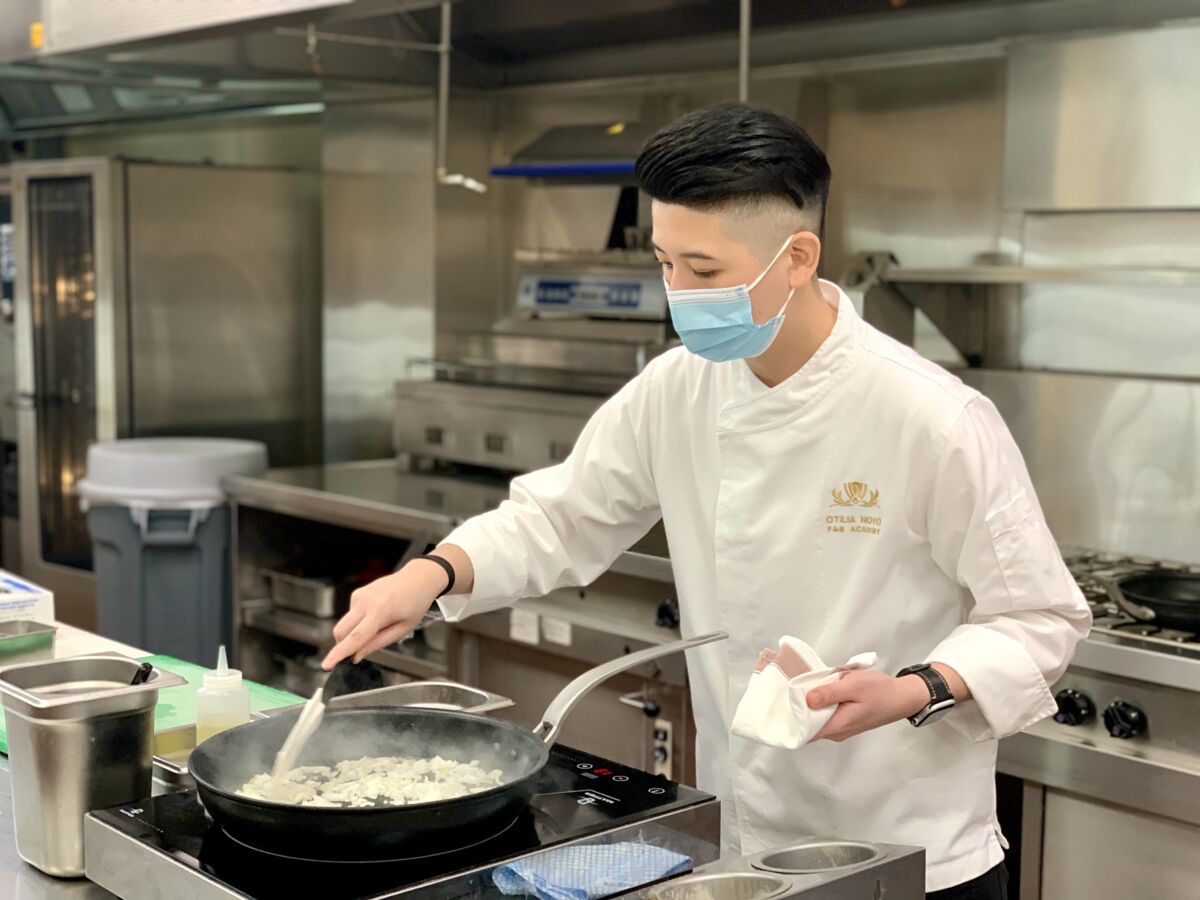
Macanese cuisine workshop
Macau is known to be home to one of the oldest (if not the oldest) fusion cuisines in the world. Could you tell our readers about Macanese cuisine’s origin and provide an insight into the historical circumstances that have led to its emergence?
Macanese cuisine is very important to the “UNESCO Creative City of Gastronomy” designation, being one of the oldest fusion cuisines in the world. Its origin dates back to when the Portuguese first settled in Macau and found themselves missing the food of their homeland. They brought back ingredients and integrated them into the local Chinese cuisine which was mainly Cantonese-influenced.
Macau’s gastronomy is one of the city’s key cultural features and a part of its intangible heritage. In your opinion, what makes it so unique?
It’s the difference of culture with the unique ingredients, cooking techniques and equipment used that makes it true fusion cuisine. Macanese cuisine is such a unique cuisine with many Macanese dishes resulting from the spice blends that the Portuguese used in an attempt to replicate European dishes. Besides the local Chinese ingredients, ingredients and seasonings of Macanese dishes also include those from Europe, Africa, Latin America, Southeast Asia, and India. Different ingredients and cooking styles were gradually incorporated into traditional Portuguese dishes cooked by Macanese families over the past centuries.
What do you think can be done in order to further establish Macau as a leading culinary destination in Asia?
If you look at the major culinary cities from around the world, it’s not only due to their own country’s cuisine but it’s important to have international cuisines represented as well to be ultimately called a culinary destination, as New York, Paris, London, Bangkok or Hong Kong are. In Macau, we need Mexican, Greek, Lebanese, Turkish, Moroccan, Scandinavian, Russian, and other countries that are not currently represented here with more Macanese, Spanish, Indian, Thai, Indonesian, Singaporean, Malaysian restaurants, and so on and less of the fast-food franchises. In addition, I believe cultivating F&B talents is the key to establishing Macau as a leading culinary destination in Asia. We set up the academy and invested significant resources to create diversified training programs that have continually provided exceptional training opportunities for young practitioners in Macau.
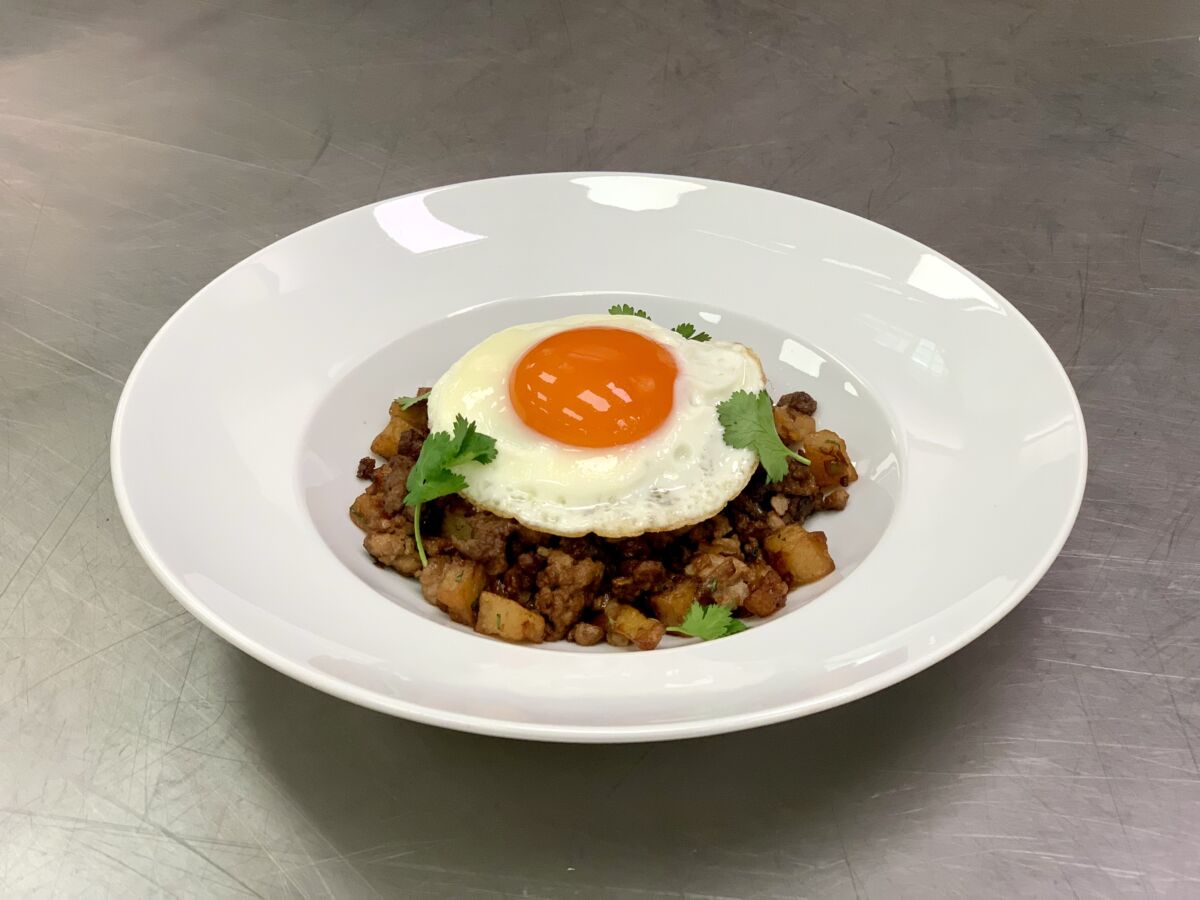
Minchi prepared at the Macanese Cuisine Workshop
What are your favorite Macanese dish to eat and why?
Minchi and tacho. Minchi is comfort food that is easy to make and cook and simply delicious while tacho is much more complicated to make and needs a lot more love and attention put into it. It’s a dish to share with family and friends.
When you’re not working, how do you spend your free time in town?
Eating good food paired with a nice glass of wine.
Do you have any favorite restaurants you love to visit in Macau?
I don’t have a particular restaurant name in mind, but one favorite thing I like to do is to try out different Portuguese restaurants in Macau to explore more Portuguese cuisine.
Could you share some advice for any aspiring chefs trying to make it in the highly competitive culinary world?
Have the passion and the right attitude. Having just passion or attitude is not enough, you need both to succeed as a chef.
Wynn Macau Rua Cidade de Sintra, NAPE, Macau, +853 2888 9966, www.wynnmacau.com/en
Wynn Palace Cotai Av. da Nave Desportiva, Macau, +853 8889 8889, www.wynnpalace.com/en

